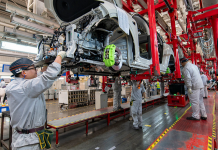BEIJING: It is an inevitable trend for China to export complete sets of equipment and transfer production capacity while Pakistan is the best destination to reach.
Based on Pakistan’s large population, the construction industry will grow rapidly in the next few years. As the demand for core material of the construction industry, steel, cement, glass and other industries will usher in excellent opportunities for development.
After the transfer of above industries, Pakistan’s industrial base can be enhanced and conditions for the establishment of a modern industrial system can be created.
On the other hand, the employment pressure of the population can be solved and professional industrial workers can be trained. Meanwhile, products can also be sold to neighboring countries and regions to increase exports. These views were expressed by Jian Peng (Philip), Chief Represent of Pakistan Shenglin Consulting Co., Ltd. (PSC), who was appointed as Honorable Investment Counsellor by BOI in an interview.
The iron and steel industry is an important embodiment of the degree of industrialization of a country. At present, China is facing the pressure of energy consumption and environmental protection, represented by the iron and steel industry, and all parts of the country have to reduce the iron and steel production capacity.
A large number of equipment is facing idle or dismantling, and many of them have a short service life and are in good condition of maintenance which can continue to be used. While Pakistan lacks relevant equipment and technology, and the cost of purchasing new complete sets of equipment is too high, which is not in line with Pakistan’s national conditions at this stage, CEN reprted. Combined with the current preferential policies of Pakistan’s Special Economic Zones (SEZs), he recommended suitable plans to Chinese automobile enterprises and spare parts suppliers, and provided consulting services.
In order to facilitate the trade between enterprises of the two countries, Jian Peng stated that it’s necessary to standardize the product standards, operation procedures, settlement procedures and contract texts as far as possible, so as to avoid misunderstandings caused by the disunity of language, law, inspection and quarantine standards.
“Pakistan’s enterprises are generally small in scale and low in concentration, so large-scale and standardized supply chain system is needed to carry out bulk trade, which requires the strength of industry organizations such as chambers of commerce and associations to integrate enterprise resources.
In addition, the supply and demand information between the two countries is asymmetric. There is a lack of authoritative and professional information release platform, and imports and exports are mainly in a small-scale and peer-to-peer way.” – Agencies






